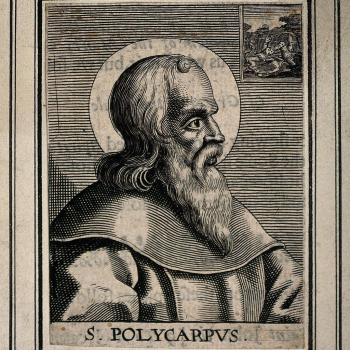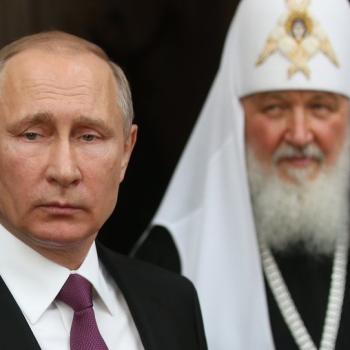 During the early 1970s–nearly fifteen years into my non-formal theological education–I made some considerable changes in my understanding of the local church. In doing this, I was mostly influenced by the biblical teachings of Dr. S. Lewis Johnson. He and my former pastor, Bob Thieme at Berachah Church in Houston, were fairly close friends. But much of what Johnson taught about the local church clashed with what the somewhat authoritarian Thieme taught, and Thieme was a graduate of Dallas Theological Seminary who had Johnson as a professor.
During the early 1970s–nearly fifteen years into my non-formal theological education–I made some considerable changes in my understanding of the local church. In doing this, I was mostly influenced by the biblical teachings of Dr. S. Lewis Johnson. He and my former pastor, Bob Thieme at Berachah Church in Houston, were fairly close friends. But much of what Johnson taught about the local church clashed with what the somewhat authoritarian Thieme taught, and Thieme was a graduate of Dallas Theological Seminary who had Johnson as a professor.
At that time, Johnson was a professor of New Testament, Greek, and Systematic Theology at Dallas Theological Seminary and someone I came to regard as a mentor of mine. (Johnson later gave me some guidance and wrote the foreword for my first book, The Gospels Interwoven.)
Dr. Johnson also taught and preached at a church in Dallas named Believers Chapel. He once taught a series on the local church and how it formed in New Testament days. I listened to those tape recorded messages. Believers Chapel had those who “ministered the Word,” such as Johnson. But it did not have “a pastor” as spiritual head who always did the preaching. Rather, it had elders and deacons as leaders. I also was influenced by writings of some Plymouth Brethren teachers on this subject. Due to Johnson’s similar teachings, he often was thought to be a Plymouth Brethren, which he was not.
My main change regarded the concept of “the pastor of the church.” That is a concept imbedded in post-apostolic church history so much that it rarely has been questioned. That is, it is thought that a local church must have a pastor, or a head pastor when there are multiple pastors at large churches, and he (she is some congregations nowadays) is chiefly responsible for the spiritual health of the congregation. The usual reasoning to support this concept is that a corporation must have a CEO, an army must have a general, and so the local church must have someone it calls “the pastor.”
The New Testament does not relate that a local church of that time had such a spiritual head, much less someone called “pastor” or “minister” or such. For instance, when the Apostle Paul wrote his letters to local churches, he did not address them to a certain person, such as a “pastor;” rather, he always addressed them to the congregation. For instance, Paul wrote, “To the church of the Thessalonians” (1 and 2 Thessalonians 1.1).
(All scripture references herein are from the New Revised Standard Version, NRSV, unless otherwise noted.)
In his other letters, Paul gets more specific. He addresses his Epistle to the Romans by saying, “to all God’s beloved in Rome, who are called to be saints” (Romans 1.7). In another epistle he wrote, “To the church of God that is in Corinth, to those who are sanctified in Christ Jesus, called to be saints” (1 Corinthians 1.2; cf. 2 Corinthians 1.1). Paul also wrote, “To the saints who are in Ephesus” (Ephesians 1.1). And he wrote, “To the saints and faithful brothers and sisters in Christ in Colossae” (Colossians 1.2). If any of those local churches had had a chief pastor as our churches do today, one would think Paul would at least recognize them by name as such in his letters. The fact that he does not suggests, but does not prove, that they did not have pastors as chief leaders.
But when Paul gets even more specific about this issue of church leadership, it becomes more apparent that each of those early churches to which he wrote did not have a spiritual head that might be called “pastor” or “reverend” or the like. For instance, Paul wrote, “To all the saints in Christ Jesus who are in Philippi, with the bishops and deacons” (Philippians 1.1). Here, Paul recognizes the leaders of this local church without calling any of them “pastors.” The word here in the NRSV and KJV translated “bishops” is episkopois in the Greek text. Other major English versions translate it herein as “overseers” (NASB, NIV, ESV). Since this single, local church to which Paul wrote was in the city of Philippi, he indicates that this church had multiple leaders who oversaw the spiritual health of the congregation. And Paul’s word “deacons” translates diakonois, which is always translated as such in major English versions. It means “servants” or “ministers” who attend to lesser matters under the overseers’ direction. How so?
Scholars generally think the concept of “deacon” in the New Testament church had its origin in the early church at Jerusalem. We read, “the Hellenists complained against the Hebrews because their widows were being neglected in the daily distribution of food” (Acts 6.1). This occurred because those first believers “had all things in common; they would sell their possessions and goods and distribute the proceeds to all as any had need” (2.45). When this complaint arose, “the twelve [apostles] called together the whole community of the disciples and said, ‘It is not right that we should neglect the word of God in order to wait on tables. There, friends, select from among yourselves seven men of good standing, full of the Spirit and of wisdom, whom we may appoint to this task, while we, for our part, will devote ourselves to prayer and to serving the word” (6.2-4). This they did, and these seven likely became the model for later deacons.
So, each early, local church had a plurality of overseers and deacons who served as leaders of the congregation. The Apostle Paul provides detailed instructions in a letter to Timothy, his associate in ministry (1 Timothy 3.1-7). He says, “whoever aspires to the office of bishop desires a noble task. Now a bishop must be above reproach,” etc. (3.1-2). Again, this word “bishop” in the NRSV and KJV translates episkopos in the Greek text. It is here rendered “overseer” in the NASB, NIV, and ESV. And in this letter to Timothy, Paul also provides instructions about selecting deacons (vv. 8-13).
My next important change of thought regarding the local church was that I began to question that Sunday morning church services must be sermon oriented, in which the pastor delivers a prepared message of perhaps 30 minutes or more in length with no interruptions from the congregation. Again, even though the New Testament is lacking in information about this subject, we don’t see anything in it to verify such a practice.
Moreover, I would say that what we have in the New Testament about the governing and ministry of the local church is somewhat contrary to our contemporary practice of local church meetings on Sunday mornings.
Now, some say that we do not need to organize and operate the local church like the early believers did as reported in the New Testament. That is, they say those accounts are for us “descriptive but not proscriptive.” My reply to that is that we Bible-believing Christians do not think that about the gospel, so why should we think it of the church? Or others might say, “what difference does it make?” In answering this question, this is my main contention: if the local church would follow the practice of the early church in how it governs, leads, and ministers, it will encounter fewer problems and remain more faithful to God and his good news (gospel) through Christ first delivered to the saints.
Thus, my next major change of thought about the local church regards how it should conduct its Sunday morning meetings. The most thorough information about how at least the so-called “Pauline churches” conducted their Sunday meetings for the entire congregation is related in 1 Corinthians 12-14. What we discover there is more of a similarity to the synagogue of that time than how such meetings of the local church are conducted in our day and have been for many hundreds of years prior.
But let us first examine briefly spiritual gifts in 1 Corinthians 12-14. Paul lists spiritual gifts as follows: wisdom, knowledge, faith, healing, miracles, discernment of spirits, tongues, interpretation of tongues (1 Corinthians 12.8-11). Notice that Paul doesn’t even mention the gift of pastor in this most extensive list of spiritual gifts in the New Testament. Paul later says, “God has appointed in the church first apostles, second prophets, third teachers, then deeds of power, then gifts of healing, forms of assistance, forms of leadership, various kinds of tongues. Are all apostles? Are all prophets? Are all teachers? Do all work miracles? Do all possess gifts of healing? Do all speak in tongues? Do all interpret?” (vv. 28-30). Paul’s obvious answer–in accordance with his previous teaching that the body is diverse by having different functioning parts–is a resounding NO! Otherwise, if we all had the same gift, it would be like all of being a hand, or an eye, or a foot on the body. How would that look–the body consists only of one big foot? (Not pun intended about Bigfoot.)
But notice that in all of this Pauline teaching about spiritual gifts which enable ministry of the church, there is no mention of pastor or anything like that. The closest Paul comes to our traditional concept of the pastor of the church may be “teacher.” And notice further that Paul means by first, second, and third that these gifts are those which benefit the church the most. Again, pastor is not among them.
Paul follows this up by explaining at length in 1 Corinthians 12 that just as the human body is composed of different parts performing diverse functions (vv. 12-26), so it is with the church which is, figuratively speaking, “the body of Christ” (v. 27). Thus, God does not make all believers apostles who are sent out, or gifted evangelists, or Bible teachers, or speakers of tongues, etc. (1 Corinthians 12.12-26).
So, where do we get this idea of “a pastor.” In the New Testament, it appears only in Paul Epistle to the Ephesians, which contains Paul’s only other list of spiritual gifts. We read of that list, “The gifts he [Jesus] gave were that some would be apostles, some prophets, some evangelists, some pastors and teachers, to equip the saints for the work of ministry, for building up the body of Christ” (Ephesians 4.11-12). This expression “pastors and teachers” translates poimenas kai didaskalous in the Greek text. So, poimen means “shepherd,” a person who tends a flock of animals such as sheep or goats. Paul here uses this word metaphorically as a person who tends to the spiritual safekeeping of believers in Jesus.
Paul once used this word poimen as a verb. We read, “from Miletus he sent a message to Ephesus, asking the elders of the church to meet him” (Acts 20.17). They came to him, he spoke a lengthy message to them which Luke records (vv. 18-35). It includes this admonition, “Keep watch over yourselves and over the flock, of which the Holy Spirit has made you overseers, to shepherd the church of God” (v. 28). Thus, Paul says the plurality of overseers in the local church are to shepherd, that is, to pastor the members of the congregation. So, there was not one who pastored the early, local church, but several, yet they were not designated with the title “pastor,” “minister,” or the like.
In this section of Acts 20, we meet up with three significant words in the Greek text which pertain to the leadership of the local church: presbyterous (elders), episkopous (bishops/overseers), and poimainein (shepherd/pastor). Obviously, the Presbyterian and Episcopal church denominations take their names from two of these words. I think the words presbyteros and episkopos in the Greek New Testament always refer to same–overseer who cares for the flock.
So, in the early church, or at least in the Pauline churches, the leadership of each congregation consisted of a plurality of overseers who cared for the spiritual welfare of the individual congregants, and the deacons probably attended more to their physical needs. Thus, there was no single person who was regarded as the spiritual head of the local congregation. And likewise, I would venture, as a non-Catholic, that the same is to be said of the entire church. That is, in the New Testament there is no such thing as a pope as a spiritual head over the church called “father” (cf. Matthew 23.9). Moreover, these two post-apostolic concepts of pope and pastor are similar.
Does this not coincide with Jesus’ teaching to his disciples wherein he said, “You know that the rulers of the Gentiles lord it over them, and their great ones are tyrants over them. It will not be so among you; but whoever wishes to be great among you must be your servant; just as the Son of Man [Jesus] came not to be served but to serve, and to give his life a ransom for many” (Matthew 20.25-28 and parallels).












